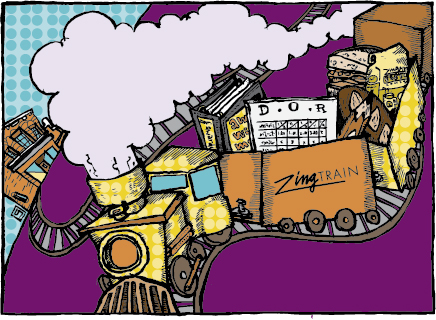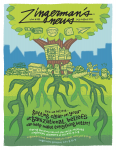Play it again and again and again and again…
So what did we decide?
If you want to take the same seminar a second time (or third or fourth or fifth time)
It’s half off!
That’s 50%
Email us to register!
PSST… Do you want to know a secret?
The current issue of the Zingerman’s print newsletter features a ZingTrain special – half off any one of our Training DVD’s!
Woah.
Use the discount code ZINGNEWS.
These seminars are HOT!
The last two, perhaps even three, sessions of Bottom Line Training, Leading with Zing! and The Art of Giving Great Service were very sold out!
If you were planning on attending any of those seminars any time soon, now might just be a really great time to sign up for the upcoming sessions!
Bottom Line Training on April 28-29, 2014
Leading with Zing! on May 5-6, 2014
The Art of Giving Great Service on June 2-3, 2014
Want to help us design our seminar schedule for August 2014-15?
We’d be so grateful if you took this very, very quick SURVEY.

The other day a few of us were in deep discussion at the ZingTrain offices. It was a topic we’d all discussed before and the conversation was more of a memory dredge than content – because for once (opinionated bunch that we are) we were all in agreement about the content!
The content we were discussing was creating a price incentive for someone to attend the same seminar twice and though there were some differences of opinion on what that incentive should be, we were all in agreement that attending a seminar more than once is a great idea and that we should offer whatever price incentive we can to encourage it.
It occurred to me as I participated in the conversation that we’d never formally articulated why we were all so certain that it was a great idea to attend the same seminar twice (or four times!) and that sharing our reasons could be an even greater incentive than a price break – especially in a world where time is sometimes more scarce than money!
So here goes!
- We’re ready to hear different things at different times.
There is much science and neuroscience and cognitive big-wordy stuff behind this observation but I believe we all know it to be true experientially. Ever read a book or watched the same movie twice?
When it comes to training, the first time you encounter an idea, you might be listening through the filters of “Can I apply this in my world?” or perhaps you’re trying to apply this new information to experiences you’ve already had. Or if you’re like me, and a little shy, the first time you’re in a room you’ve never been in before with a bunch of people you’ve never met before, everything you hear and say has a little nervous buzz around it.On the other hand, if you encounter the concept again after you’ve had a chance to try it on for size or the opportunity to share it with or teach it to others, you listen in a different way and hear things you hadn’t quite heard the first time around.
At Zingerman’s we speak of the four levels of learning. Listening. Reflecting. Assimilating & Acting. Teaching. One of the first steps of getting trained to teach a class at Zingerman’s is to attend the class again because you listen differently when you listen in order to be able to teach. In fact, I believe that we listen in different ways at each and every one of those stages of learning [a topic ripe for a longer conversation and perhaps the subject of a future newsletter!] but the point here is that it’s well worth our time to attend the same training multiple times as we move through the different levels of learning.
- We hear different things amongst different cohorts.
ZingTrain seminar attendees come from all walks of life, every size of business you can think of and pretty much every level of the organization. We frequently hear this feedback from our seminar attendees : “It was so reassuring to find that other successful and driven businesses/business owners/managers/trainers/(insert organizational group of your choice here) face the same challenges I do!” It is indeed.As you might imagine, in that setting, infused with the excitement of having found peers, one might listen to the content and the reactions of the other seminar attendees with a particular filter. But if you were to attend the same seminar with your boss and a very clear (and hopefully inspiring!) mandate on what to bring back to the business from the seminar, you’d listen differently. Or if you were the boss and you were coming with five of your staff, you might listen differently. I could continue with the examples, but I think you’re seeing the point, yes?
Those are two broad categories and I believe they cover a pretty nuanced range of situations in which we might hear the same information differently. I’m certain there are more and I’m certain that you’d have some excellent suggestions which I would love to hear. But while we all put our heads together to compile a more exhaustive list, I’d like to share a different way to think about the same idea – this idea of the factors that affect what we “hear” in training and what we do with our training. At Zingerman’s, the leader’s role in training is to provide the staff with Context, Reinforcement, Use [CRU].
- Context: This refers to the context we use to frame the information we are hearing. Do you have a vision for your business and is the seminar one of the resources that is going to help you get there? Did your leadership send you to the seminar with the mandate that you are to implement a way to measure customer service within 3 months of attending the seminar? Are you coming back to the seminar to feel inspired and re-invigorated?
- Reinforcement: This particular aspect makes more sense when you’re the Leader providing positive reinforcement for your staff members after they’ve completed the training. And yet, if you’re the business owner attending the seminar, it couldn’t really hurt to give yourself a little positive reinforcement about your decision to come! You can find that amongst like-minded peers or in your journals or just call us!
- Use: As you might imagine, Use literally refers to using the information you encounter in training. We think this is a critical step, and in fact, we recommend that people use what they learn in training within 48 hours of learning it because otherwise – poof!
Ultimately, if the Context or Reinforcement or Use changes, the listening and learning change and in our experience, become deeper and richer and more nuanced.
As you read this, please know that the point of this edition of OnTrack isn’t just to have you come back for a ZingTrain seminar you’ve already taken (although we would be so incredibly happy if you did) – the point is to also frame a different way of thinking of training and how you can effectively use (re)training in your organization. Whether it’s because it’s been a tough winter and everyone is just ready for a little inspiration or because a particular systemic change you were trying to implement didn’t stick or you want to give a boost to a particular systemic change that you really, really want to stick, it’s worth considering using your existing training resources in a different context.
All of which makes for a nice conversation but perhaps it still feels a little theoretical at this point? So here’s a little check-list of real life situations that might help bring home what I’m really trying to say here.
I would attend the same training twice because:
- I want to reward the team for a great season.
- I want to start teaching this topic.
- I’ve become competent at this but now I want to be a ninja!
- I want to get re-inspired.
- I want the team to get re-inspired.
- I hit a roadblock.
- I want to infuse new energy into an old system.
- I want to take implementation to the next level.
- I want to “shepherd” new staff into our organization by attending training with them.
- I miss ZingTrain and the seminar lunches!
Which one resonates with you? What would you add to the checklist? I would attend the same training twice because… I can’t wait to hear from you!




Zingerman’s Art for Sale